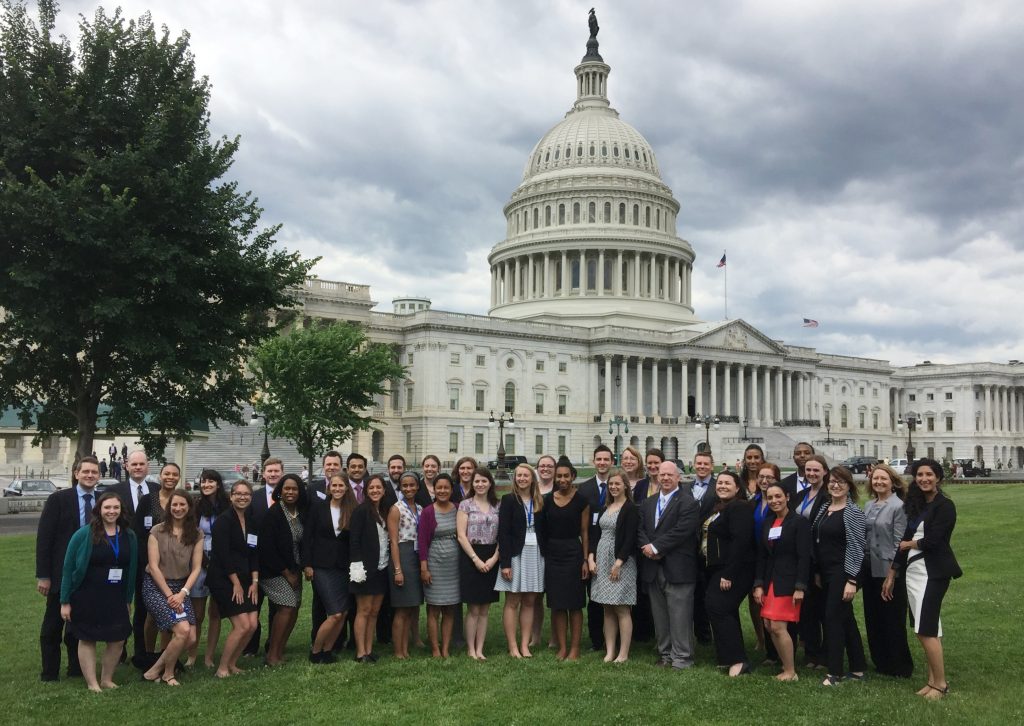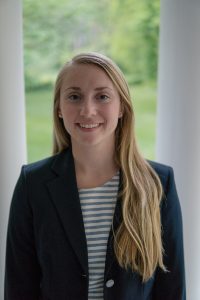
The 2018 AMS Summer Policy Colloquium participants prepare to meet with Congressional staff members.
By Jessamin Straub
Jessamin Straub is a graduate student in the Marine Sciences Department at UNC-Chapel Hill and part of a CRC education program led by CRC Director Dr. Gavin Smith. Straub co-organized a Climate Change and Resilience Symposium last spring and was chosen as a participant in the American Meteorological Society’s Summer Policy Colloquium this summer. She is a CRC Science and Engineering Workforce Development Grant recipient for the upcoming school year.
Portions of this post originally appeared on the UNdertheC blog.
Last fall semester I was excited to take CRC Director Dr. Gavin Smith’s Survey of Natural Hazards and Disasters course. During the course, Dr. Smith brought in many great speakers that enriched our discussions in class and exposed us to new knowledge and opportunities. One of those speakers, Dr. Bill Hooke, spoke of the importance of learning from past natural disasters to improve policies and getting scientists involved in the policy process. When I spoke with Dr. Hooke after class, he encouraged me to apply to the American Meteorological Society’s Summer Policy Colloquium (AMS SPC), to expand on my interests in science policy.
This June I attended the AMS SPC, where I had the opportunity to immerse myself in science policy through discussions with working professionals and hands-on exercises. The goal of the program is to arm scientists with expertise in the policy-making process and to help the scientific community engage with decision-makers. I believe it’s important for scientists to have a seat at the table when policy decisions are made to ensure available scientific knowledge is used to inform policy.
During the colloquium, I had the opportunity to learn about policy basics and how decisions are made, talk with federal officials and congressional staff about the legislative process, and understand current science and policy issues. Daily topics included science diplomacy, public-private partnerships, perspectives on executive leadership, understanding science policy in the Arctic and science advocacy. Approximately 600 scientists have gone through this program in the past 18 years. The program provided me with the opportunity to not only engage with and understand the policy process but also to create unique professional connections, an important component of be involved in science policy.
Throughout this experience I learned the role that science plays in society and how important it is for science and scientists to be engaged in the policy process. Did you know fewer than 3 percent of members of Congress have any background in science or engineering? However, recently there has been growing interest by early career scientists to engage in the policy process, such as through the National Science Policy Network (NSPN). During the Climate Change and Resilience Symposium I co-organized last semester, students were eager to get involved in science policy and recommended future symposia incorporate more aspects of science policy. There is a growing understanding that scientific expertise, critical thinking skills and data-driven decision-making are vital skills for effective policy, as shown by the large number of scientists running for office in 2018.
Beyond being a politician, there are lots of ways for scientists to get involved with policy. As I learned through my time in D.C., scientists interested in policy usually take two different, but complementary, roles – the advocate and the analyst. Although scientists can be cautious and hesitant about how to engage with policy, there are many resources available to help. For anyone interested in getting involved with science policy, I highly recommend looking into various Science & Technology Policy Fellowships. During my time at the Colloquium, I learned the importance and value these Science and Technology Policy Fellowship provide for scientists.
What is a Science and Technology Policy Fellowship?
Science and Technology Policy Fellowship programs provide effective and up-to-date scientific knowledge in government while providing unique experiences to scientists interested in careers involving public use of scientific information. Fellows have the exciting opportunity to contribute to the policymaking process and gain experience with federal decision-making and policy development. The fellowships place scientists either in executive branch agencies, in the offices of an individual member of Congress, or on a committee for one year in Washington, D.C.
Fellows have the opportunity to provide substantial input to public policy, while expanding beyond their research and scientific skills. The AAAS Science & Technology Policy Fellowships (STPF) is an initiative of more than 30 scientific and engineering societies. Each scientific society selects and supports (financially and professionally) scientists and engineers for a one-year fellowship in Washington, DC. These fellowships are typically a pipeline for scientists to gain understanding and skills in policy to either continue in the public policy field, and or use the skills and knowledge they gained, and return to previous professions with a different perspective.
Some examples include:
- American Geophysical Union (AGU)
- Geological Society of America (GSA)
- American Meteorological Society (AMS)
- American Geosciences Institute (AGI)
Why should graduate students be interested in a Science and Technology Policy Fellowship?
- Check out this helpful video series with AAAS S&T Policy Fellows
- Gain hands-on policy experience in a challenging and exciting environment
- Develop a wealth of professional contacts while becoming a member of an influential network of fellows
- Hone universally useful skills such as adaptability, effective communication, networking and leadership
- Learn about the scientific funding process (important for securing those highly sought-after competitive grants!)
- Expand on analytical skills in a different setting
- Learn about career opportunities outside of academia
Tips/Resources:
- A helpful resource for graduate students in STEM searching for federal fellowships, internships, and scholarships is science.gov.
- Many resources exist to help scientists interested in policy at any stage of their career. In addition to the AAAS Science & Technology Policy Fellowships (STPF) listed above, some other organizations and societies that support Science & Technology Policy Fellowships include:
- Be sure to keep an eye out at your professional science meetings that you attend, such as AGU and GSA. Often there will be events to attend such as a Q&A about certain fellowships and even a time to chat with current fellowship recipients!
Funded by the U.S. Department of Homeland Security, the primary objective of the Science and Engineering Workforce Development Grant is to ensure that U.S. citizens are trained in homeland security-related science and engineering disciplines in order to maintain U.S. leadership in science and technology, as required by the Homeland Security Act of 2002. The grant program provides tuition assistance, stipends, and funding for travel to professional conferences and internships. Grant recipients are expected to actively participate in research projects under the mentorship of a faculty member in the student’s field of study.
